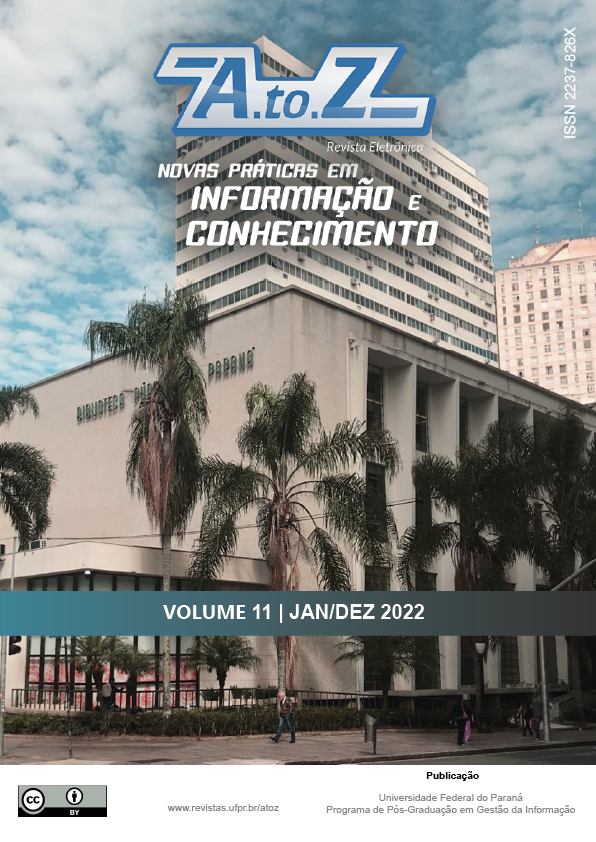Uma perspectiva epistemológica crítico-dialética da Gestão do Conhecimento Científico: contribuições da praxeologia Bourdeusiana
DOI:
https://doi.org/10.5380/atoz.v11i0.83420Palabras clave:
Gestão do Conhecimento Científico, Epistemologia Crítico-dialética, Praxeologia de BourdieuResumen
Introdução: Os posicionamentos epistemológicos, teóricos e metodológicos trazem implicações diretas sobre como são construídos os objetos de pesquisa. A partir do mapeamento de eixos epistemológicos centrais, escolheu-se o crítico-dialético para discutir a Gestão do Conhecimento Científico (GCC), mais especificamente, a partir das contribuições epistemológicas e teórico-metodológicas do pensamento praxeológico de Bourdieu, compreendendo as suas proposições sobre o campo científico como expressão do eixo escolhido. Método: Foi adotada a discussão teórica e revisão literária de obras de Bourdieu e de aspectos conceituais da GCC, tomando-a como uma área interdisciplinar cujos fenômenos podem ser lidos pela dinâmica do campo científico e que está voltada para processos de produção e difusão do conhecimento científico que se efetivam pelo encontro da Gestão do Conhecimento (GC) e da Comunicação Científica (CC). Resultados: A partir da discussão sobre princípios epistemológicos do eixo crítico-dialético para a compreensão do fazer científico, enfatizando as concepções de Bourdieu sobre campo científico, os resultados apontaram contribuições para repensar a definição da GCC e oferecer subsídios teórico-metodológicos para o desenvolvimento de pesquisas no âmbito da GCC. Conclusão: A discussão permitiu estabelecer recursos investigativos para as pesquisas sobre GCC, dentre os quais a formulação de questões balizadoras para a construção de instrumentos de coleta e análise de dados sobre o funcionamento da GCC como um campo, identificando, por exemplo, ações dos agentes para obterem capitais científicos e temporais, bem como para transformarem o próprio campo, além de itens como a aquisição de conhecimentos científicos, seu armazenamento e formas de criação e compartilhamento.
Citas
Bachelard, G. (1996). A formação do espírito científico: Contribuição para uma psicanálise do conhecimento. Contraponto.
Bernal, J. D. (1939). The social function of science. George Routledge & Sons.
Bourdieu, P. (2019). Homo Academicus. Editora UFSC.
Bourdieu, P. (1983). O campo científico. In R. Ortiz (Org.). Pierre Bourdieu: Sociologia (pp. 122-155). Ática.
Bourdieu, P. (2004). Os usos sociais da ciência: Por uma sociologia clínica do campo científico. Edunesp, 2004.
Bourdieu, P. (2017). Para uma Sociologia da Ciência. Edições 70.
Bourdieu, P., & Chamboredon, J. & Passeron, J. (2007). Ofício de sociólogo: Metodologia da pesquisa na sociologia. Vozes.
Caribé, R. de C. do V. (2015). Comunicação Científica: reflexões sobre o conceito. Informacao & Sociedade-Estudos, 25(3), 89–104. Recuperado de https://brapci.inf.br/index.php/res/v/93078.
Carrasco, A. de O. T. (2016). A dialética. São Paulo: Martins Fontes.
Carvalho, L. S. (2017) A abordagem sociocultural da produção de conhecimento científico. In R. M. Marteleto, & R. M. Pimenta. (Org). Pierre Bourdieu e a produção social da cultura, do conhecimento e da informação. Garamond.
Creswell, J. W. (2014). Investigação qualitativa e projeto de pesquisa: Escolhendo entre cinco abordagens. Penso.
Davenport, T. H., & Prusak, L. (1998). Conhecimento empresarial: Como as organizações gerenciam o seu capital intelectual (4a. Ed). Campus.
Freire, P. (2020). Pedagogia do Oprimido. Paz e Terra.
Gamboa, S. (2000) A dialética na pesquisa em educação: elementos de contexto. In I. Fazenda (Org.). Metodologia da Pesquisa Educacional. Cortez.
Grenfell, M. (2018). Uma reflexão sobre a teoria do campo (e dentro dela) na prática. Tempo Social, 30(2), 195-217. https://doi:10.11606/0103-2070.TS.2018.132281.
Jorge, V., & Albagli, S. (2017). Pierre Bourdieu e a produção do conhecimento científico: Reflexões sobre uma ciência aberta. In R. M. Marteleto, & R. M. Pimenta. (Org). Pierre Bourdieu e a produção social da cultura, do conhecimento e da informação. Garamond.
Kuhlen, R. (2004). Change of Paradigm in Knowledge Management: Framework for the Collaborative Production and Exchange of Knowledge. [Anais]. 69th IFLA General Conference and Council, Berlin.
Leite, F. C. L. (2007). Comunicação científica e gestão do conhecimento: enlaces conceituais para a fundamentação da gestão do conhecimento científico no contexto de universidades. Transinformação, 19(2), 139-151. Recuperado de: https://www.scielo.br/j/tinf/a/qLh7S9vyrcdZRxFdx4d6vvN/abstract/?lang=pt
Leite, F. C. L. (2006). Gestão do conhecimento científico no contexto acadêmico: Proposta de um modelo conceitual (Dissertação de Mestrado). Programa de Pós-Graduação em Ciência da Informação, Universidade de Brasília, Brasília, DF, Brasil.
Monteiro, J. M. (2018). 10 lições sobre Bourdieu. Vozes.
Nobre, M. (2004). A teoria crítica. Jorge Zahar.
Nunes, J. A. (2004). O que se entende por cultura científica nas sociedades baseadas no conhecimento. In Conferência Prioridade à Cultura Científica. Universidade de Coimbra. Recuperado de: http://cla.isr.ist.utl.pt/docs/prici2_arriscado.pdf.
Peruzzo, C. M. K. (2017). Pressupostos epistemológicos e metodológicos da pesquisa participativa: Da observação participante à pesquisa-ação. Estudios sobre las culturas contemporáneas, (3), 161-190. ISSN: 1405-2210. Recuperado de: https://www.redalyc.org/jatsRepo/316/31652406009/31652406009.pdf.
Scartezini, N. (2011) Introdução ao método de Pierre Bourdieu. Cadernos de Campo: Revista de Ciências Sociais, 14 e 15. Recuperado de: https://periodicos.fclar.unesp.br/cadernos/article/view/5159.
Seaton Moore, C. E. & Bresó Bolinches, S. (2001) El desarrollo de un sistema de gestión del conocimiento para los institutos tecnológicos. Revista Espacios, 22(3).
Shinn, T. & Ragouet, P. (2008). Controvérsias sobre a ciência: Por uma sociologia transversalista da atividade científica. Associação Filosófica Scientia Studia, Editora 34.
Takeuchi, H. & Nonaka, I. (2008). Gestão do Conhecimento. Bookman.
Vázquez, A. S. (1997). Filosofia da práxis (2a. Ed). Paz e Terra.
Velho, L. M. S. (2011). Conceitos de Ciência e a Política Científica, Tecnológica e de Inovação. Sociologias, 13(26), 128-153. Recuperado de: https://www.scielo.br/j/soc/a/q5SC5wGHhpGpzL86NZyDgDS/abstract/?lang=pt.
Vogt, C. & Morales, A. P. (2016). O discurso dos indicadores de C&T e de percepção de C&T. Organización de Estados Iberoamericanos para la Educación, la Ciencia y la Cultura e Los Libros de la Catarata, pp. 25-31.
Ziman, J. (1979). Conhecimento público. Editora da Universidade de São Paulo.
Descargas
Publicado
Cómo citar
Número
Sección
Licencia
La revista AtoZ es una revista científica de acceso abierto y los derechos de autor de artículos y entrevistas pertenecen a sus respectivos autores/encuestados. Los autores otorgan a la AtoZ el direito de incluir el material publicado (revisado por pares/pos-print) en em sistemas/herramientas de indización, agregadores o curadores.
Los autores tienen permiso y se les anima a depositar sus artículos en sus páginas personales, depósitos y/o portales institucionales anteriormente (pre-print) y posteriormente (post-print) a la publicación en esa Revista. Se pide, si possible, que se apunte la referencia bibliográfica del artículo (incluyendose la URL) en base a la AtoZ.
La AtoZ es sello verde por Diadorim/IBICT.
Todo el contenido de la revista (incluyendo las instrucciones, modelos y política editorial) a menos que se indique otra cosa, están bajo una Licencia de Atribución de Bienes Comunes Creativos (CC) 4.0 Internacional.
Cuando los artículos son publicados por esta revista, se pueden compartir (copiar y redistribuir el material en cualquier soporte o formato para cualquier propósito, incluso comercial) y adaptar (remezclar, transformar y crear a partir del material para cualquier propósito, incluso si es comercial). Debe dar el crédito correspondiente, proporcionar un enlace a la licencia e indicar si se realizaron cambios.
La AtoZ no cobra cualquier tasas por la sumisión y/o procesamiento y/o la publicación de artículos.



























